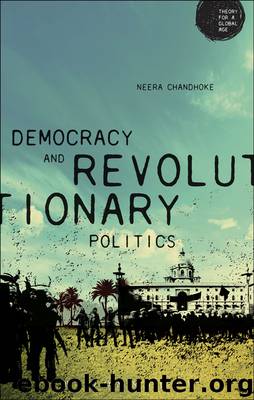Democracy and Revolutionary Politics by Neera Chandhoke;

Author:Neera Chandhoke;
Language: eng
Format: epub
Publisher: Bloomsbury UK
4
Can Revolutionary Violence Be Justified?
Introduction
The paradox of revolutionary violence is simply this. Scholars and analysts can understand and appreciate why people opt for revolutionary violence. Yet the costs that this form of politics carries in its wake are too heavy and cause unease. If we seek to justify revolutionary violence, we will have to make a stronger case than just triple disadvantage, or the ultimate objective of violence or even the prevention of greater harm. I argue in this chapter that the only circumstance in which revolutionary violence can be justified is overlapping injustice that betrays the basic presuppositions of a democratic state.
Contextual justification
Invoking images of brutality, of predators and of hapless victims, of savage violations of the body and damage to the mind, of crime, of dismemberment, of decapitation, of assault, of rape, of mutilation, of murder, of genocide, of ethnic cleansing and of other acts designed to maim and harm, violence, not surprisingly, is burdened by a great deal of moral overload. The question whether violence can ever be justified is one that is likely to evoke some astonishment, even a great degree of disparagement. It may well appear outrageous to some, and plainly irrelevant to others. Our interlocutors can protest with considerable outrage but perfect propriety that violence is a moral wrong; it can never ever be justified.
There is cause for unease with these absolutist moral stands. Do we really have to buy into the creed of political violence to acknowledge that in certain, and in very specific, circumstances violence can be justified? The justification of violence, to put the point across starkly, is context-dependent. One ready example that comes to mind is the infliction of some degree of harm to avert a larger harm. Picture someone who tries to forcibly prevent a child from rushing into a busy street and, in the process, inflicts injury upon the child. It will hardly be fair to the person, who has saved the child from serious harm, if we condemn her for exerting force when she pulled back the child and bruised the latter’s forearm. A surgeon dexterously wields a knife to remove a malignant tumour and the patient suffers pain. This sort of harm can hardly be seen as a wrong because it is essential for the health of and the reasonable certainty of a longer life for the patient. Violence in such cases is certainly unavoidable.
Other circumstances come to mind. The police may be forced to fire on a gunman who holds a busload of children hostage. Axiomatically persons who perpetrate violence on others have to forfeit their own rights. If the state participates in, or sanctions or is inactive when a minority group is subjected to ethnic cleansing, surely the group under attack is justified in using violence to save the lives of members. Matters are different when it comes to, say, gang wars. There is nothing to justify violence here, not the context, not the objective and not lack of intention. In other cases cited above, violence is justified simply because there is no other way of preventing harm.
Download
This site does not store any files on its server. We only index and link to content provided by other sites. Please contact the content providers to delete copyright contents if any and email us, we'll remove relevant links or contents immediately.
| Arms Control | Diplomacy |
| Security | Trades & Tariffs |
| Treaties | African |
| Asian | Australian & Oceanian |
| Canadian | Caribbean & Latin American |
| European | Middle Eastern |
| Russian & Former Soviet Union |
The Secret History by Donna Tartt(18157)
The Social Justice Warrior Handbook by Lisa De Pasquale(11951)
Thirteen Reasons Why by Jay Asher(8451)
This Is How You Lose Her by Junot Diaz(6434)
Weapons of Math Destruction by Cathy O'Neil(5829)
Zero to One by Peter Thiel(5488)
Beartown by Fredrik Backman(5351)
The Myth of the Strong Leader by Archie Brown(5237)
The Fire Next Time by James Baldwin(5016)
How Democracies Die by Steven Levitsky & Daniel Ziblatt(4952)
Promise Me, Dad by Joe Biden(4908)
Stone's Rules by Roger Stone(4855)
100 Deadly Skills by Clint Emerson(4689)
A Higher Loyalty: Truth, Lies, and Leadership by James Comey(4550)
Rise and Kill First by Ronen Bergman(4544)
Secrecy World by Jake Bernstein(4388)
The David Icke Guide to the Global Conspiracy (and how to end it) by David Icke(4378)
The Farm by Tom Rob Smith(4322)
The Doomsday Machine by Daniel Ellsberg(4245)
